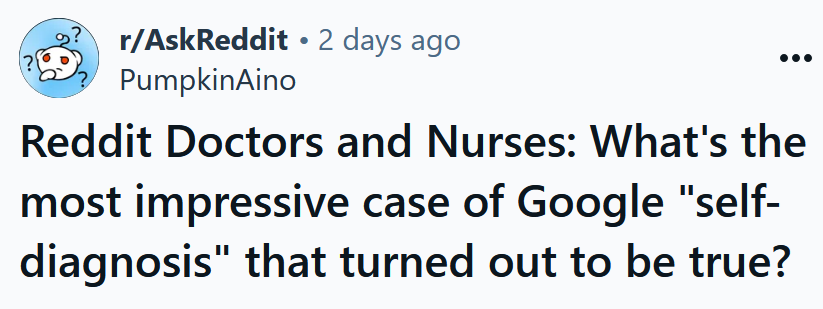Top Stories
Google Diagnoses: 15 Stunning Self-Diagnoses That Saved Lives

UPDATE: A recent thread on Reddit is igniting discussions about the power of self-diagnosis, as users share stories of how Google has led them to crucial medical discoveries. This phenomenon highlights a serious issue: many patients, particularly women and those with larger bodies, are often dismissed by medical professionals when they attempt to advocate for their health based on online research.
In a thread initiated by user u/PumpkinAino, Redditors recounted instances where their self-researched symptoms not only led to correct diagnoses but also saved their lives. Despite initial skepticism from doctors, these users’ experiences reveal a pattern of medical professionals overlooking patients who take health matters into their own hands.
Here are some remarkable cases that underline the importance of listening to patients:
1. Ménière’s disease diagnosed by Dr. Google
One user reported persistent ringing in the ears, leading them to self-diagnose Ménière’s disease after extensive research. Despite being dismissed by their GP, a visit to an Out of Hours clinic confirmed their diagnosis through an MRI.
2. Cherry cola urine signals Rhabdomyolysis
In a shocking twist, a hospital lab worker recognized the alarming color of their urine as a sign of Rhabdomyolysis. After being initially dismissed at the ER, further tests revealed dangerously high CK levels.
3. Double uterus discovered after years of pain
A woman who struggled with painful periods and unusual bleeding finally connected her symptoms to having two uteruses after hearing about the condition on a podcast. This self-diagnosis led to confirmation via medical scans.
4. A diabetic student’s science project saves their life
A high school student, noticing symptoms that matched those of diabetes, was able to act quickly after a class project on systemic diseases. A hospital visit confirmed they were on the brink of a diabetic coma.
5. Yeast infection diagnosed after 10 years
A brother suffering from chronic ear infections took matters into his own hands, sending samples for testing. The results identified Candida as the main culprit, leading to effective treatment.
6. Kidney cancer diagnosed from fatigue
Another user, despite experiencing only fatigue and a poor appetite, insisted on further testing after initial dismissals. Eventually, a lung scan revealed kidney cancer, prompting crucial intervention.
7. Misdiagnosis of depression leads to a thyroid issue
After being told she was depressed, a woman advocated for further thyroid testing, which revealed dangerously low heart rates and a serious thyroid condition.
8. Ovarian torsion nearly overlooked
Despite excruciating pain, medical staff initially misdiagnosed a user with kidney stones due to bias against her body size. Multiple ultrasounds ultimately confirmed her self-diagnosis of ovarian torsion.
9. Nurse self-diagnoses pericarditis
A pregnant nurse who experienced sharp chest pain was dismissed by ER staff, only to later confirm her own diagnosis of pericarditis, highlighting the critical need for patient advocacy.
10. Pulmonary embolism diagnosed by family intuition
One user recognized concerning symptoms in their mother post-surgery and urged her to seek immediate medical attention, leading to the discovery of multiple pulmonary embolisms.
These stories, while varied, share a common theme: the importance of listening to patients and validating their concerns. Many individuals felt they had to fight for their health, often feeling belittled by healthcare professionals for relying on their research.
As this conversation continues to trend online, it raises questions about the healthcare system’s approach to patient advocacy and the role of technology in modern medicine. With these personal accounts surfacing, it’s clear that the dialogue surrounding self-diagnosis is more critical than ever.
Next Steps: As patients increasingly turn to online resources, the medical community must adapt by fostering open communication and respecting patients’ insights. This shift could not only improve outcomes but also bridge the gap in patient-provider relationships, leading to more effective healthcare for all.
Stay tuned for more updates on this developing story as it unfolds across social media platforms and health discussions worldwide.
-

 Science2 weeks ago
Science2 weeks agoIROS 2025 to Showcase Cutting-Edge Robotics Innovations in China
-

 Politics2 weeks ago
Politics2 weeks agoJudge Considers Dismissal of Chelsea Housing Case Citing AI Flaws
-

 World2 weeks ago
World2 weeks agoBravo Company Veterans Honored with Bronze Medals After 56 Years
-

 Lifestyle2 weeks ago
Lifestyle2 weeks agoStone Island’s Logo Worn by Extremists Sparks Brand Dilemma
-

 Top Stories2 weeks ago
Top Stories2 weeks agoIndonesia Suspends 27,000 Bank Accounts in Online Gambling Crackdown
-

 Health2 weeks ago
Health2 weeks agoStartup Liberate Bio Secures $31 Million for Next-Gen Therapies
-

 Sports2 weeks ago
Sports2 weeks agoMel Kiper Jr. Reveals Top 25 Prospects for 2026 NFL Draft
-

 Health2 weeks ago
Health2 weeks agoTop Hyaluronic Acid Serums for Radiant Skin in 2025
-

 World2 weeks ago
World2 weeks agoHoneywell Predicts Record Demand for Business Jets Over Next Decade
-

 Politics2 weeks ago
Politics2 weeks agoNew Jersey Voters Urged to Register Ahead of November Election
-

 Lifestyle2 weeks ago
Lifestyle2 weeks agoMary Morgan Jackson Crowned Little Miss National Peanut Festival 2025
-

 Sports2 weeks ago
Sports2 weeks agoYamamoto’s Mastery Leads Dodgers to 5-1 Victory in NLCS Game 2









